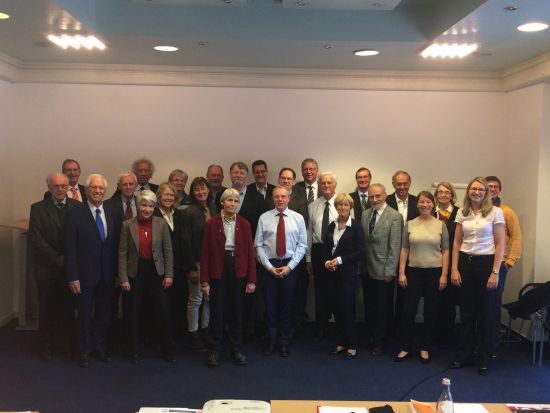7th RFPD Academy of RFPD German Section
 For seven years now there has been an „RFPD Academy“, founded by Rotaracters who are RFPD members. This year, on November 14th 2014 in Frankfurt, amongst the 30 participants of the annual German RFPD Academy were many Rotarians and spouses of Rotarians in addition to Rotaractors. The academy was opened by the Chair of RFPD German Section, Prof. Franz Josef Radermacher, University of Ulm, and Head of FAW, Germany. In his keynote speech he talked about the context of global population growth, one of today's greatest challenges alongside poverty, inequality, hunger, financial crisis, war on terror, destruction of the environment, and an accelerated technology trend in the working world. But there is a „Message of Hope“, according to the consensus of the Club of Rome Conference in September 2014, it is possible to obtain fair income distribution, access to education and medical care for all people through the realization of an ecological and social market. To this end, the work of RFPD in the area of maternal and child health is one essential component. For seven years now there has been an „RFPD Academy“, founded by Rotaracters who are RFPD members. This year, on November 14th 2014 in Frankfurt, amongst the 30 participants of the annual German RFPD Academy were many Rotarians and spouses of Rotarians in addition to Rotaractors. The academy was opened by the Chair of RFPD German Section, Prof. Franz Josef Radermacher, University of Ulm, and Head of FAW, Germany. In his keynote speech he talked about the context of global population growth, one of today's greatest challenges alongside poverty, inequality, hunger, financial crisis, war on terror, destruction of the environment, and an accelerated technology trend in the working world. But there is a „Message of Hope“, according to the consensus of the Club of Rome Conference in September 2014, it is possible to obtain fair income distribution, access to education and medical care for all people through the realization of an ecological and social market. To this end, the work of RFPD in the area of maternal and child health is one essential component.
Deputy Chair of RFPD German section and RFPD Board member Michael Morath presented the work and goals of RFPD, founded in 1996 to achieve universal access to information and voluntary family planning for all people. He addressed the mission of RFPD to support Clubs as a resource for the area of focus maternal and child health. Every year, thousands of women and babies die during pregnancy, at birth or through abortions. This vicious circle can only be stopped if aid projects offer voluntary family planning promoting the empowerment of women and if maternal and infant mortality will be reduced through a comprehensive approach including quality assurance, as in the lighthouse project initiated by RFPD.
Professor Doctor Büttner from the Berlin Institue for Population and Development talked about global demographic challenges and chances. He explained notions such as the demographic dividend which can be an advantage for countries like Nigeria if having broad international support. Education, women empowerment and voluntary, responsible family planning are decisive factors to this end. Doctor Taube from the GIZ reported about the project work in the area of „Sexual and Reproductive Health and Rights“, including family planning, antenatal care, training of health workers, peer education and intersectoral collaboration. With these approaches, the GIZ is active in 40 countries.
Rotary member Bierbrauer presented a"Best-Practice"- health project in Rarieda, one of the poorest regions of Kenya, emphasizing the importance of sustainability in a big project like this. Bierbrauer plead to start with the children as they are the ones who can keep and revive traditonal knowledge and are more motivated to change behaviour positively than adults. He reported that two hospital wards have been build and equipped. Today, almost every family in the project area has her own latrine and far fewer children are undernourished. Many parents were able to improve their income thanks to training courses in handicraft, animal husbandry and farming.
Robert Zinser complemented Bierbrauer's report with examples from „Maternal and Child Health“ projects in Pakistan and Nigeria. He emphasized that it is crucial to address the problem of maternal mortality comprehensively. In Nigeria, RFPD educates the people about family planning and antenatal care while at the same time trains health personnel and equips hospital wards with quality assurance. The inclusion of traditional village leaders and government officials into the project and their consent to it are further essential aspects to ensure the project's sustainability. Also, it is reasonable to carry out complementing satellite projects that take care of a steady water and power supply. In the project "Post-Partum Family Planning'“ in the slums of Karachi, Pakistan, education, training of midwives and family planning go hand in hand. Such comprehensive approaches can be very successful in improving the situation of the people sustainably.
The Medical Coordinator of the German RFPD Section, Hans-Peter Richter, talked about his experiences as a neurosurgeon in health projects in Niger, Benin, Turkmenistan and Georgia. Many times he experienced that aid worker provided health projects with expensive technical equipment that the local people were not able to handle or service. As a consequence, the instruments got dusty in a store room. Therefore, it is necessary not only to ask the local people what they really need, but also to train them as specialized staff and to keep in mind spare parts and repairs.
|